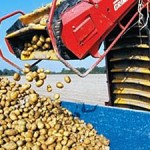 When it comes to water issues, PepsiCo‘s fizzy drinks tend to get all the attention. But the company is also a huge manufacturer of snack foods. Its food operations, PepsiCo is finding, offer huge potential to save water — including going “off the water grid.”
When it comes to water issues, PepsiCo‘s fizzy drinks tend to get all the attention. But the company is also a huge manufacturer of snack foods. Its food operations, PepsiCo is finding, offer huge potential to save water — including going “off the water grid.”
At a UK factory that makes Walkers potato chips — or “crisps,” as the locals prefer — PepsiCo is exploring the possibility that the potatoes themselves could yield enough water to operate the factory.
Potatoes offer a unique opportunity to turn off the taps, PepsiCo’s plant managers have recognized. When raw spuds arrive at the loading dock, they’re about 80 percent water by volume.
Indeed, the biggest challenge in making chips crispy is extracting all that water. As the thinly sliced spuds pass through the deep fryer, a thick fog of steam rises from the oil’s surface, as the water steams off.
Instead of letting it escape through a chimney, PepsiCo is exploring the possibility of capturing the vapor, condensing it to reuse and maybe recapturing the heat energy at the same time. It’s a move the company estimates could save the plant in Leicester, England, $1 million per year.
PepsiCo’s UK and Ireland arm has become a leader in setting ambitious environmental and operating goals. These also include being fossil fuel free by 2023 and achieving zero landfill across its supply chain by 2018 (click here to see more on the UK and Ireland goals).
Thinking like this is helping PepsiCo push ahead with ambitious goals globally, to cut water use across the beverage-and-snack conglomerate’s worldwide operations, says Dan Bena, PepsiCo’s director of sustainable development.






